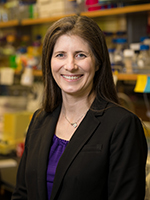Living History
MBP director Danielle Tullman-Ercek is featured prominently in a new book about the rapidly growing field of synthetic biology.
Fewer than 200 words.
That is how quickly Northwestern Engineering's Master of Biotechnology Program (MBP) comes to the forefront of a new book being hailed as an look at an innovative scientific field that was at the core of our battle against a virus killing millions around the globe.
The book, written by Ted Anton, is called Programmable Planet: The Synthetic Biology Revolution (Columbia University Press, 2023). Its opening chapter features a narrative of MBP director Danielle Tullman-Ercek and her lab colleagues, giving readers a behind-the-scenes look at the moment they discovered how viruses could be transformed from destructive forces of death into delivery vehicles for medicines and vaccines. 
Tullman-Ercek is one of several faculty with ties to MBP featured in the book, which chronicles the history of synthetic biology.
“It is not a coincidence. Northwestern is one of the top three hubs in the United States for synthetic biology,” said Tullman-Ercek, who has led MBP since 2019. “That said, we are not about reputation but impact. Being featured in the book shows that our faculty are having a positive impact on the world through their work.”
That impact is showcased in the introductory chapter of the book. It brings readers into the lab and onto a video call where Tullman-Ercek and her colleagues realize they have discovered something with life-changing implications. The ability to tinker with viruses, defuse their danger, and infuse them with medicine was at the heart of the rapid development of the COVID-19 vaccine in 2020.
That story is an important one to share, Tullman-Ercek said, but the book goes where previous works haven’t on the topic of synthetic biology.
“To me, this book is a remarkably comprehensive history of this relatively new but exponentially growing field,” she said. “It goes beyond medicine to explain how synthetic biology has the potential to help with sustainability, bioremediation, feeding the planet, and more.”
And it doesn’t shy away from the failures and ethical conundrums in a field that gives humans the ability to modify the building blocks of life. Tullman-Ercek said it is important to acknowledge and address those issues at such a key time in the field’s development.
“Failures can be at the research level – experiments don't always show us what we expect – but also in translating the research findings to societal use,” she said. “It is our challenge and opportunity to harness the genetic code and the building blocks of life to address the grand challenges of our world.”
Those include medicine, but also agriculture, sustainable production, and remediation of damage to our water, air, and land, she said.
Beyond being a good early compendium of the history of synthetic biology, the book is an instructive one for the students in the program Tullman-Ercek leads, she said.
“MBP students are already primed to learn about business, policy, and communication and the interplay between those fields,” she said. “This book shines a light on how those factors have been playing out for a relatively new field.”
To be a part of the book, especially in such a prominent position, is a rewarding recognition of the work Tullman-Ercek and her colleagues have done and an inspiration for the further work they hope to do, she said.
It also shows how vital the research being done by the scientific community’s various labs is and how they all can fit together for the greater good.
“To take a step back and read about my work from this broad perspective was illuminating in a way that I did not expect,” she said. “It was rather amazing to see how clearly it complemented and connected to the broader community's work.”

